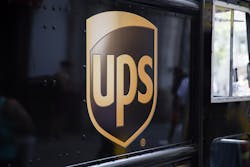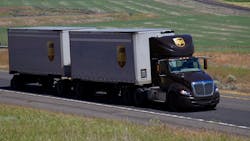Calamity averted, UPS-union deal highlights importance of last mile
Let it be said that when opposing forces claim victory, everybody wins. Both UPS Inc., the No. 2 for-hire FleetOwner 500 carrier, and the union that represents around 340,000 of the parcel-delivery giant's delivery drivers and package handlers were trumpeting the virtues of a tentative July 25 deal that almost certainly prevents a calamitous work stoppage by union members that could have begun Aug. 1 and cost the carrier and the economy billions by many estimates.
Out of the deal announced on Tuesday, UPS got the certainty that its status as a juggernaut of e-commerce (and behind only FedEx Corp. on the for-hire FleetOwner 500) would go on uninterrupted, accelerated by post-pandemic consumer buying habits. The International Brotherhood of Teamsters got pay and benefits concessions its members had long sought for helping to shepherd UPS through changing times and the surge in volume.
The deal also ensured that the company wouldn't bleed volume, perhaps permanently, and it wouldn't have to burn money in the daily scramble to reroute parcel traffic using non-union employees or lose copious business to rivals FedEx and DHL (No. 59 on the for-hire FleetOwner 500). UPS handles 25 million parcels daily—or about 6% of the entire U.S. gross domestic product—and profits there have risen 140% since the company and its union inked their last contract in 2018, two full years before COVID.
See also: Union calls off strike against Yellow after benefits concession
It was clear once talks restarted on July 25 (after they broke down with finger-pointing from both sides following the July 4 holiday) that UPS was in a hurry to make sure it wouldn't have to sacrifice those gains. The tentative deal was reached on the first day of renewed negotiations between it and the union.
Had a work stoppage occurred, Michigan-based think tank Anderson Economic Group estimated that potential losses of a 10-day strike (five days shorter than a prior 1997 walkout) could have topped $7 billion, including losses by customers of the parcel carrier totaling $4 billion. Both numbers dwarf the losses through the 1997 strike, which cost UPS an estimated $850 million (about $1.6 billion in 2022 dollars). The group also estimated that the forfeiture of direct wages by UPS employees could have exceeded $1 billion.
Teamsters members, both full- and part-time, get more jobs and better pay out of the 2023 tentative deal, their forced overtime is ended, they gain increased health and safety concessions, and will receive Martin Luther King Jr. Day as a company holiday—just to name a few of the new perks.
The union argued that its members are sorting and delivering millions more packages—6.2 billion globally in 2022, up from 5.5 billion in 2019, according to one estimate—and Teamsters leaders have said that UPS should use the $13 billion it generated in profits last year to improve pay and working conditions.
In the end, that's apparently what is happening.
'Win-win-win' agreement
"Rank-and-file UPS Teamsters sacrificed everything to get this country through a pandemic and enabled UPS to reap record-setting profits," the union's president, Sean M. O'Brien, remarked in the Teamsters' July 25 statement detailing the tentative deal from the union's perspective.
"The union went into this fight committed to winning for our members. We demanded the best contract in the history of UPS, and we got it," O'Brien added. "UPS has put $30 billion in new money on the table as a direct result of these negotiations."
UPS CEO Carol Tomé joined the chorus in the company's statement Tuesday: "Together, we reached a win-win-win agreement on the issues that are important to Teamsters leadership, our employees, and to UPS and our customers. This agreement continues to reward UPS's full- and part-time employees with industry-leading pay and benefits while retaining the flexibility we need to stay competitive, serve our customers, and keep our business strong."
See also: UPS, union agree to resume contract talks
Despite earlier gloom-and-doom predictions, analysts pegged the chances of a settlement high and a strike low because the company and the union already had bridged many differences. By the time the union and UPS restarted negotiations on July 25, UPS had agreed to end a two-tier pay system in which part-time workers were paid $5 less per hour than full-timers. UPS also included MLK Day as a work holiday and had agreed to end mandatory overtime on drivers' days off.
And just last month, the company decided to equip more trucks with air conditioning gear starting Jan. 1 and conceded that existing vehicles could receive other additions like fans and air vents. The issue has been a sticking point for the union since last summer when reports surfaced in the news of UPS workers hospitalized for heat exhaustion. This remained an issue with the record-breaking heat this summer in many parts of the U.S.
Union vote to last almost all of August
The tentative five-year deal covers U.S. Teamsters-represented employees in small-package roles and is subject to voting and ratification by union members. The union said the 176 UPS Teamster locals in the U.S. and Puerto Rico will meet on July 31 to review and recommend the tentative agreement. Member voting runs Aug. 3 to Aug. 22. There's not much doubt that most union members will vote to ratify, as O'Brien said in the Teamsters statement that the agreement "sets a new standard in the labor movement and raises the bar for all workers."
The new UPS-Teamsters deal includes:
- Wage increases for full- and part-time workers that the union called "historic": Existing full- and part-time UPS Teamsters would receive $2.75 more per hour in 2023 and $7.50 more per hour over the length of the contract, which would last until 2028. Existing part-timers would receive no less than $21 per hour immediately. New part-time hires would start at $21 per hour and advance to $23. Existing part-timers would receive a 48% average total wage increase over the next five years of the tentative deal.
- Wage increases and reclassification for full-timers: They will keep UPS Teamsters the highest-paid delivery drivers in the nation, improving their average top rate to $49 per hour, according to the union. All UPS Teamster drivers are classified as 22.4s, meaning they would be reclassified immediately to regular package car drivers and placed into seniority, "ending the unfair two-tier wage system at UPS," the union said.
- Current UPS Teamsters working part-time: Under the new tentative deal, they receive longevity wage increases of up to $1.50 per hour on top of new hourly raises, compounding their earnings.
- Safety and health protections, including vehicle air conditioning and cargo ventilation: UPS will equip in-cab air conditioning for larger delivery vehicles, sprinter vans, and package cars purchased after Jan. 1, 2024. All vehicles will get two fans and air induction vents in the cargo compartments.
- UPS Teamster part-timers will have priority to perform all seasonal support work using their own vehicles with a locked-in eight-hour guarantee. For the first time, seasonal work will only be contained to five weeks from November to December.
- The creation of 7,500 new full-time Teamster jobs at UPS and the filling of 22,500 open positions at the parcel company establishing more opportunities through the life of the agreement for part-timers to transition to full-time work.
Added Teamsters General Secretary-Treasurer Fred Zuckerman on July 25: "UPS came dangerously close to putting itself on strike, but we kept firm on our demands. In my more than 40 years in Louisville representing members at Worldport—the largest UPS hub in the country—I have never seen a national contract that levels the playing field for workers so dramatically as this one."
UPS shares closed the day on July 25 down almost 2% (1.94%) and they continued down (.36%) as the markets opened on Wednesday.
Reached by FleetOwner the morning of July 26, Stifel director and transportation, future mobility, and global logistics analyst J. Bruce Chan attributed the drop in UPS shares to early shareholder jitters about the total 6.5% wage increase conceded to the union plus other costs increases from benefits in the tentative five-year deal that could mean a rise in operating costs at UPS, including the pay hikes, in "double digits," in the range of 11% to 12%.
Chan added that “while the work stoppage would have been costly, it essentially would have been a nearer-term issue and, from the perspective of shareholders, the higher long-term costs are more than what people anticipated.”
Details of the new deal between UPS and its Teamsters
- Wage increases for full- and part-time workers that the union called "historic": Existing full- and part-time UPS Teamsters will receive $2.75 more per hour in 2023 and $7.50 more per hour over the length of the five-year pact. Existing part-timers will get no less than $21 per hour immediately. New part-time hires would start at $21 per hour and advance to $23. Existing part-timers will receive a 48% average total wage increase over five years.
- Wage increases and reclassification for full-timers: They will keep UPS Teamsters the highest-paid delivery drivers in the nation, improving their average top rate to $49 per hour. All UPS Teamster drivers will be reclassified to regular package car drivers and placed into seniority, "ending the unfair two-tier wage system at UPS," the union said.
- Current UPS Teamsters working part-time: They receive longevity wage increases of up to $1.50 per hour on top of new hourly raises.
- Increased opportunities: The creation of 7,500 new full-time Teamster jobs at UPS and the filling of 22,500 open positions at the parcel company establishes more opportunities through the life of the agreement for part-timers to transition to full-time work.
About the Author
Scott Achelpohl
Managing Editor
Scott Achelpohl is a former FleetOwner managing editor who wrote for the publication from 2021 to 2023. Since 2023, he has served as managing editor of Endeavor Business Media's Smart Industry, a FleetOwner affiliate.



